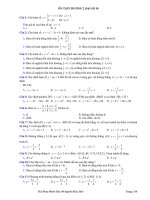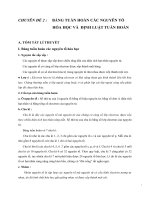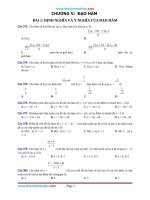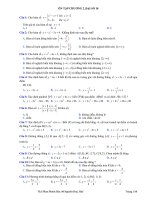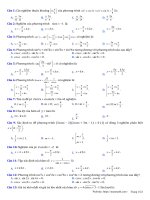Tải Bài tập trắc nghiệm môn tiếng Anh lớp 10 Unit 11: National Parks có đáp án - Bài tập ôn tập tiếng Anh lớp 10 Unit 11
Bạn đang xem bản rút gọn của tài liệu. Xem và tải ngay bản đầy đủ của tài liệu tại đây (95.07 KB, 5 trang )
<span class='text_page_counter'>(1)</span><div class='page_container' data-page=1>
<b>OBJECTIVE PRACTICE TEST OF UNIT 11</b>
<i><b>Choose the word that has the underlined syllable pronounced different from the others.</b></i>
1. A. worked B. hoped C. watched D. lived
2. A. invader B. destroy C. spend D. Soldier
3. A. nature B. toxic C. plant D. Contain
4. A. played B. missed C. called D. moved
5 A. nation B. tourist C. study D. return
<i><b>Choose the word whose main stress is placed different from the others.</b></i>
6. A. ethnic B. explore C. orphan D. fauna
7. A. dependent B. survival C. minority D. recognize
8. A. temperature B. chemical C. habit D. location
9. A. abandon B. national C. wilderness D. butterfly
10 .A. establish B. disaster C. tropical D. dependent
<i><b>Choose the best answer (A, B, C or D) that best completes each sentence.</b></i>
11. Cuc Phuong National Park __________ over 200 square kilometers of rainforest.
A. contains B. gets C. hold D. covers
12. An interesting ______of this park is Orphanage, where orphaned animals are taken care of.
A. advantage B.feature C.area D.zone
13. A child who has lost one or both of his parents by death is called ________ child.
A. an abandoned B. an orphan C. a homeless D.orphanage
14.The _________ has threatened many of animals in this park.
A.rainforest B. population C. increase D.contamination
15. They went camping in the beautiful _________ of the rainforest.
A.wildlife B. wildness C.wild D.wilderness
16. This park was _________ before World War II
A. set B. located C. established D. stationed
17. We were very _________at his success.
A. surprised B.interested C.keen D.fond
18. One species is dependent __________ another of survival.
A. on B. to C. of D.at
19. My home village is ____________ 40 kilometers north of the capital..
A. located B. held C. laid D. surrounded
20. The cattle drank from a river polluted with toxic chemicals..
A.waste B. colorless C. odorless D. poisonous
21. We _________ to the beach yesterday if the sun had been shining.
A.will go B.would go C.would have gone D. had gone
22. If he _________ up earlier, he ________ to work on time.
A. got/ would get B. had got / would get
C. would get/ got D. would have got / had got
23. We wouldn’t have been to the cinema_________we hadn’t had ticket.
A. if B. unless C. because of D. in spite of
24. What ________ if you had met him yesterday?
</div>
<span class='text_page_counter'>(2)</span><div class='page_container' data-page=2>
25. They _________ the farm if they _________ enough money.
A. had enlarged/ would have had B. would enlarge/ had had
C. enlarged/ would have D. would have enlarged/ had had
<i><b>Choose the underlined part (A,B,C or D) that needs correcting.</b></i>
26. He wouldn’t have known the news if you had told him.
A B C D
27. I had gone to see you if I’d known what you were ill.
A B C D
28. My brother would buy a sports car if he don’t have the money.
A B C D
29. If I have free time next Sunday, I would visit my grandmother.
A B C D
30. If I were you, I would have forgotten about buying a new car.
A B C D
<i><b>Choose one sentence that best rewrites the root one.</b></i>
31. He didn’t work hard, so he failed the exam.
A. If he worked hard, he wouldn’t fail the exam.
B. If he hadn’t worked hard, he would have failed the exam.
C. He would have passed the exam if he had worked hard.
D. He had passed the exam if he would have worked hard.
<i>32. I was tired because I stayed up late last night.</i>
A. If I hadn’t stayed up late at night, I wouldn’t have been tired.
B. I hadn’t been tired if I wouldn’t have stayed up lat.
C. If I had stayed up late at night, I would have been tired.
<i>D. I wouldn’t be tired If I didn’t stay up late at night. </i>
33. The shirt didn’t fit me so I didn’t buy it.
A. If the shirt fit me, I will buy it.
B. If the shirt fitted me, I would buy it.
C. If the shirt had fitted me, I would have bought it.
D. I didn’t buy the shirt due to it didn’t fit me.
34. He didn’t know French so he didn’t go to Paris for his holiday.
A. Unless he knew French, he wouldn’t go to Paris for his holiday.
B. If he knew French, he would have gone to Paris for his holiday.
C. If he had gone to Paris, he would have known French.
D. Had he known French, he would have gone to Paris for his holiday.
35. He worked lazily so he was sacked.
A. If he hadn’t worked lazily, he wouldn’t have been sacked.
<i>B. If he worked lazily, he would be sacked.</i>
C. Unless he had worked lazily, he would have been sacked.
D. If he hadn’t worked lazily, he would have been sacked.
36. He didn’t take any medicine so he feels worse now.
A. If he had taken the medicine, he would have felt better now.
B. If he had taken the medicine, he would feel better now.
C. If he took the medicine, he would feel better now.
</div>
<span class='text_page_counter'>(3)</span><div class='page_container' data-page=3>
37. We want to buy that house but we don’t have enough money.
A. Unless we have enough money, we won’t buy that house.
B. We would have bought that house if we had had enough money.
C. If we had enough money, we would have bought that house.
D. If we had enough money, we would buy that house.
38. They couldn’t go home because it stormed terribly.
A. If it hadn’t stormed terribly, they could have gone home.
B. If it didn’t storm terribly, they would go home.
C. It stormed terribly so that they couldn’t go home
D. They couldn’t go home due to terribly storm.
39. Without Jack’s help, I wouldn’t have been able to move the table.
A. Jack hadn’t helped, but I could move the table.
B. Jack didn’t help, so I hadn’t been able to move the table.
C. If Jack hadn’t helped, I wouldn’t have been able to move the table.
D. Had Jack helped, I wouldn’t have been able to move the table.
40. You wouldn’t have made many mistakes if you had been careful.
A. You didn’t make many mistakes because you weren’t careful.
B. You made many mistakes because you were careful.
C. You were careful, so you didn’t make many mistakes.
D.You weren’t careful, so you made many mistakes.
<i><b>Read the following passage and choose best answer ( A,B,C or D ) for each blank.</b></i>
The ostrich is the (41) _______ bird in the world, and an adult can be more than ninety kilos.
Most wild ostriches live in southern Africa, but there are only a (42)_________of them left. Like all
birds, ostriches have wings, (43)________ they cannot fly. They use their wings to help them
(44)_________when they are running. Ostriches can run very fast , from sixty-five to ninety kilometers
an hour, so it is very difficult for (45)_________ animals to catch them.
41. A. large B. larger C. largest D. most largest
42. A.few B. little C. lot D. many
43. A. or B. and C. but D. except
44. A. direct B. change C. alter D. turn
45. A. another B. other C. others D. one other
<i><b>Read the passage below and choose one best answer for each question.</b></i>
Parks in our country are wonderful playgrounds and millions of people visit them every year. There
are places where you can camp without charge or you can rent rooms in a hotel. You can take a long
walk in the forests, take boat trips, or climb mountains. You are not allowed to hunt in the park, so there
are many wild animals. You can fish in the streams of most of the parks. The park keepers sometimes go
with the visitors on walks to tell them about the animals, plants, and mountains. They also have
programmes and talks at the campgrounds and in the hotels so that people can learn all about the park
and the things that are in it.
46. We can camp in the parks _____________.
A. without having to pay anything B. with a small fee
</div>
<span class='text_page_counter'>(4)</span><div class='page_container' data-page=4>
C. go skiing D. go by boat
48. The word “ streams ” in line 4 is closest in meaning to ______________.
A. small rivers B. ponds C. lakes D. big sea
49. The word “ them ” in line 5 refers to ______________.
A. parks B. visitors
C. park keepers D. animals
50. Which of the following statements is NOT true?
A. There are many animals in the parks.
B. We can walk and have talks with the park keepers.
C. We are allowed to fish in most of the parks.
D. We can hunt in the parks.
<b>Read the passage carefully and choose the correct answer.</b>
Scientists believe they now have scientific evidence to prove that ecosystems work better when there is
greater variety of species within them. This biodiversity is being lost destroying natural mechanisms that
could repair the damage caused by man.
Findings show that losing plants and animals is not only reducing our quality of life but actually
endangering our very existence. We cut down rich rainforests and replace them with one species
plantations, such as pine and eucalyptus. We plough up meadows rich in different grasses and herbs and
replace them with one grass, for instance rye or wheat.
When a natural ecosystem is simplified the basic processes in the ecosystem are altered and even
damaged. Without their biodiversity they are not able to serve as the natural clearners of our planet. No
longer are they able to absorb the carbon dioxide that is being produced in excess. The result is global
warming, caused by the increase in the 'greenhouse effect', and ultimately, or even 'sooner, there will be'
a change in the world's climate.
51.Which of the following is the best title for the passage?
a. How Ecosystems Work Better
b. The Loss of Biodiversity
c. The Variety of Species
d. Natural Mechanisms
52.Which of the following is not a species used to replace a rich ecosystem?
a. Herbs
b. Pine
c. Eucalyptus
d. Rye
53.What is the purpose of paragraph 2?
a. To show natural mechanisms at work.
b. To give examples of the loss of biodiversity.
c. To give example of variety of species.
d. To show how ecosystems can work better.
54.What, according to the passage, might be the final result of the simplification of natural ecosystems?
a. The basic processes are altered
b. There is loss of biodiversity
c. There is global warming
d. There is a change in the climate.
</div>
<span class='text_page_counter'>(5)</span><div class='page_container' data-page=5>
a. Indifferent
b. Negative
c. Positive
d. Neutral
<b>ĐÁP ÁN </b>
1. D 11. A 21. C 31. C 41. C
2. D 12. B 22. A 32. A 42. A
3. A 13. B 23. A 33. B 43. C
4. B 14. D 24. C 34. D 44. D
5. A 15. D 25. D 35. A 45. B
6. B 16. C 26. C 36. B 46. A
7. D 17. A 27. A 37. D 47. C
8. D 18. A 28. C 38. A 48. A
9. A 19. A 29. C 39. C 49. B
10. C 20. D 30. B 40. D 50. D
</div>
<!--links-->



